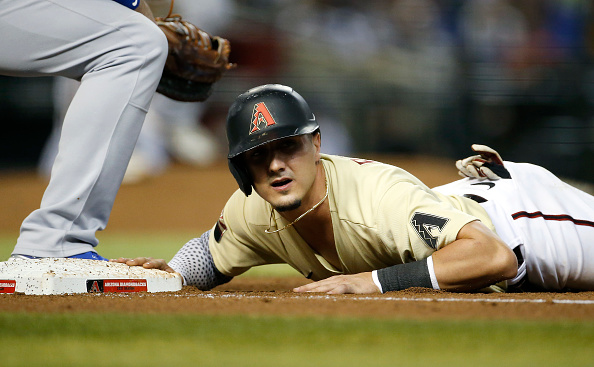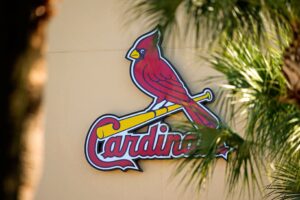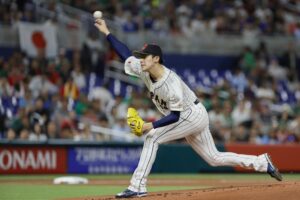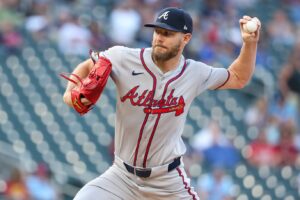Josh Rojas of the Arizona Diamondbacks Addresses Media on First Day Back
The players on the Arizona Diamondbacks 40-man roster began their return to camp Friday morning. Not all have made it back yet, with the official report date being Sunday. Several off-the-record conversations occurred, along with two press conferences. Utility man Josh Rojas was the first player to address the media Friday morning. He spoke on several subjects.
Press Conference
On being back:
First day back (is) exciting…feels good. We’ve been waiting for this one for a while. It’s good. We got everything done, and I did my best to stay ready for this day, whenever it came. It happened so fast — it was rumored, and then we had our team vote. 30–40 minutes later, we got done taking ground balls, and it was showtime. Report day is Sunday, physicals Sunday, and camp starts Monday. So it’ll be fun.
On the short ramp-up to 2020 preparing them for 2022’s abbreviated spring training:
I know it did for me for sure. That 2020 year was a learning experience for me. We got sent home, I stayed in shape for a couple of weeks, and then I kind of gave up on it. I thought there was no shot. When the season kicked off again, I came in out of shape, underweight, and wasn’t really ready. Then I was trying to kick it back into high gear really fast. At this level, you can’t do that. So I made sure this time to stay ready.
If it’s a couple of weeks, if it’s two months, three months, you’ve got to stay on top of your stuff. You’ve got to be ready, because (of what) just happened. I got a text that it might be on, and then it was on. (Now we) report days three days later. I’m just glad that I stayed ready, and I don’t feel anxious to have to make up ground in the next couple of days.
(To stay ready, I) just stayed on my stayed on my grind, four days a week, with massages mixed in on Wednesdays. (I was) working out every morning, taking ground balls, hitting in the cage, getting some live ABs against guys.
The players, as a whole, did a really good job of staying ready. There were a lot of places where there were 15, 20, 30 guys meeting up and basically running our own practices. Ground balls, live bullpens, live Abs, hitting on the field. There were a lot of colleges letting us out on their fields. It was a really good offseason. This is probably one of the most productive off-seasons I’ve had.
On How the Players Did in the CBA:
I felt like we did a really good job. We had a couple a lot of ground to make up from the last CBA. And I think we did a really good job of staying together as a unit. Old guys, young guys communicating. I learned a lot this offseason about the business side that I had no idea went on…. Hopefully I’m here for the next CBA and will be ready to go at it again.
What It Meant for the Older Players to Fight for Guys Like Him:
It means a lot, especially because, you know, they made their money. And it’s easy for those guys to say, “You know what, I made my money. I did my time. Let’s just sign it and get on with the game.” We ended up playing 162, but the stance they were taking…. They were willing to miss games and lose some of their money. (That) says a lot coming from them when their money per game is pretty high. So for them to stand by our side and have our backs and (the backs of) the future players to come, it shows a lot. As a younger player, if I make it to the next CBA, I want to do the same for the next guys.
On the Highs and Lows of the Negotiations:
The toughest part was (this.) I get all my initial information from the media. You see all this stuff that gets tweeted out, the ESPN reports, and then you get the updates from the actual meetings. Then you think, “Wait, they’re not the same.” So it’s tough when one side is spewing out certain information, the other side is spewing out certain information, and then you get the facts. At the beginning, I kept thinking, “Oh, we’re gonna get a deal done in the next couple days.” Then I got an update and saw, “Oh, we’re nowhere close.” And (it was) the same thing over and over.
Once I got the groove of (waiting for) the updates from the people who are actually in the meetings, it was much easier to get through it, being patient and staying ready. (Thinking) when it happens, it happens.
The first (near-deal) was a roller coaster for sure. I showed up to hitting. Our rep, (Nick) Ahmed, was there. I came in saying, “Alright, Nicky, you ready? We’re gonna get a deal done.” He looked at me and said, “Nah, it’s not close.” So I was like, All right, and now I know, to wait to hear from, you know, the people that are actually in the meetings. So, after that I was just staying ready.
On Communicating with His Teammates during the Off-season:
It went really well. We had an entire team group chat (that gave) us updates on what was going on in the meetings. That group chat lit up when we had our team vote. Once (we needed) a vote, everybody voted. And then it was like, “Alright, a majority of the teams voted yes, so we’re on now. We just gotta wait for the signatures.” Then everybody started asking when our report date (was), and we got all that. It went really well. I thought we communicated really well the whole offseason.
On Removing the Shift in 2023:
I wasn’t the biggest fan of taking out the shift. But as a hitter, I like that there was a cat-and-mouse game. Obviously, when you hit into the shift and it gets you out, it’s pretty upsetting. But the other side of it was there was also a pretty big hole. With two strikes, I had the third base side open, because the third baseman went to short, and with less than two, I had the six-hole open.
The pitchers (need) to make their pitch. If they’re not going to throw it in, and they leave one out over the plate, I can take my easy knocks the other way. So there’s both sides of it. It was a strategy thing. There are a lot of hitters in the league (whose) spray charts are pretty heavy in one area. I like the fact that if you are a hitter (that is) going to hit the ball in one area, and we can put guys there, then we should be able to do that. But it’s another part of the game that that we have to get used to. Now we’re going to have to figure out a way to take away those hits from where we have to stand.
On Playing with a Pitch Clock:
We had the pitch clock in Double-A. I didn’t mind it. You actually kind of get used to it. Now you see guys that are getting called up that play to the pitch clock. Without even realizing it, they’re playing a little bit faster. You learn what you can and can’t do. In Double-A, you had to get used to it at the at the beginning. But once you got used to it, you got your rhythm. You step out; you take couple of breaths; you’re back in. Same for the pitcher. You can step off and do your thing, but then you’re back on the rubber by a certain amount of time. It’ll take some getting used to.
On Whether He Enjoyed the Faster Pace:
If I’m on defense, I’d like to hitter to get in the box. But as a hitter, I like to take my time. So there’s both sides of it. I don’t mind either way. As long as everybody has to play under the same rules — everybody’s gonna have to get used to it — I don’t mind. As long as I know the rule, I’ll abide by it.
On Bunting Now that the NL Has Adopted the Designated Hitter:
This year, I think I’m going to try to mix in a couple more bunts for hits, but you’re not really going to need it as much anymore. I do think it’ll help with run production on the National (League) side. Having that pitcher in the nine-hole cuts off some rallies sometimes, having to bunt him over instead of being able to swing it with a designated hitter. It’ll improve run production. I don’t mind the DH — I liked it when it was DH on one side and no DH on the other. But I also like that there will be a little more run production now on the National League side.
On Off-season Shoulder Surgery:
I had a clean-up on the shoulder at the end of the year last year. It’s doing really well. I’m full-go. It feels really good. I’m really happy I did the surgery. I’ve been doing everything — hitting, throwing, taking ground balls. Everything feels good. The extra couple of weeks helped me a little bit, but yeah, I’m ready to go.
On Whether His Shoulder Impacted His Play at the End of 2021:
I’d have to say it did, a little bit. I tried to do everything I could to get it to feel good for each and every game, but yeah. There was some pain there at the end of the year, and it probably limited the power numbers a little bit. But I fought through it, and I was out there. So if I’m out there, I gotta produce, and that’s what I tried to do.
On the Diagnosis:
It was just some loose bodies. It was pretty much just some impingements and bone on bone. I got the joint cleaned up. It was it was bone-on-bone. The cartilage was frayed. It needed surgery. There were a couple options that we discussed. But ultimately, the team (and I) felt like it was the best option to get surgery so that nothing comes back in the middle of the year.
I think I lost strength a little bit. With the injury, it was harder to work out. It was harder to do everything that I was doing to stay strong throughout the year. Once you get pain like that, it’s tough to grind through it. I tried to grind through it and did the best I could. Did alright with it, but I was happy I did the surgery.
On When the Shoulder Problems Began:
That’s the crazy part — I don’t know. I still remember it was (about) a week before the All-Star Break when it started. It was a day game and it started bugging. Felt a little sticky. We tried to get soft-tissue work and some stretching, some maintenance stuff. But it just progressed. By that last month, month and a half, it was pretty painful.
I don’t know if there were “loose bodies.” They did clean off the bone. I can’t think of the medical term, but they cleaned it up. Made it look nice; made it feel nice. (Smile)
On Whether He Noticed a Difference:
Oh yeah, I noticed. It’s actually crazy. I got the surgery, and they gave me a nerve block. It blocked the whole arm. So you wake up, and it’s like if you’ve ever fallen asleep on your arm and it’s completely dead. It’s like that for 24 hours. So I remember lying there, and I was trying so hard to move my hand and tried to will my brain to move it, and it was completely dead.
But I slept that first night with the sling on just so I didn’t roll over on it. That next morning when I woke up, I (thought), “Oh my goodness, it already feels good!” It was an easy surgery; easy clean-up. They said it would feel good right away. Obviously, there’s some scar tissue stuff that I had to work through, but that took about a month, month and a half, and I felt good.






